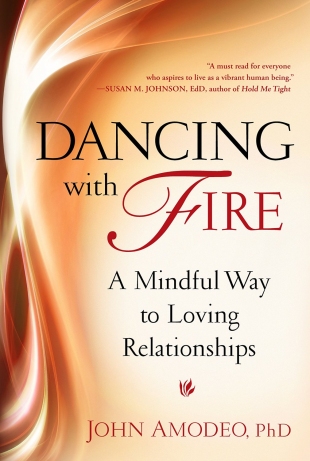"Contrast this transcendent view of enlightenment with a more embodied process view of spiritual progress. The word 'progress' is hazardous because such evaluations can lead to self-critical comparisons or suggest a linear path that just doesn't exist. Yet perhaps the lack of distinct markers presents an even greater hazard: clinging to distorted views of liberation. Please hold these lightly:
"• The spiritual path is one of reducing suffering, not eliminating desire. Being spiritual doesn't mean exorcising our amygdala. Being in an animal body, we will always have inner promptings to lurch toward some things and avoid other things. Desires will continue to arise regardless of how 'advanced' we are. However, when we have more spaciousness around our longings and emotions, we are less prone to slide into clinging and craving. We aren't as triggered when our longings are unmet. We are less driven or consumed by desire. We get a clearer sense about which longings to act upon (the ones that truly nourish us) and which ones to notice and relinquish (those that lead to suffering for ourselves or others). Such discernment enables us to make better choices and be more peaceful.
"• Fear and anxiety continue to appear, but we are less overwhelmed by them. We hold them gently and seek support from friends when necessary. We recognize that fear is part of the human condition. Courage doesn't mean being fear-free; it means acting even though something in us feels afraid.
"• We are affected when we're mistreated, abused, or traumatized and when we observe abuse and injustice around us. We may be disappointed when things don't go our way or if we fail to succeed at some venture, but such feelings pass quickly, and we don't cling to the belief that we're a failure or succumb to a crippling shame. We may be upset to witness sorrowful events around us as we become more sensitively attuned to life. Our heart quivers in sorrow as we see people suffer or the environment being damaged. If we feel moved to help, we do so as a wounded healer rather than a person who is above it all and has all the answers.
"• We need people in order to live a fulfilling and meaningful life. We are interdependent beings, not independent ones. We interact with the community for emotional support and to earn a living. Life is enhanced through loving connections, but we also have the capacity to embrace solitude.
"• We continue to experience emotions like hurt, sorrow, grief, fear, and embarrassment, but we learn to hold these feelings gently and gracefully; we are not so tormented by them. Rather than think something is wrong with us, we meet our feelings without shame. We experience them more poignantly because we're less defended, but we have less emotional reactivity as we develop inner resources to face them. We are more likely to respond rather than react. We also have more awareness of our limits so that we don't overextend ourselves. Even so, there are times when equanimity deserts us and we may experience stress or loneliness, and we're okay with this. Or we're okay about not being okay with it.
"• There is no end point to spiritual growth, no final destination. We are an evolving process, an ongoingness. Spiritual practice will not transform us into a person at perfect peace. Instead, our reptilian brain remains alive and well. We cannot flip a switch and turn off the 'old brain,' nor would we want to, because we need it sometimes to survive! However, spiritual practice can soften our instinctual reactions by cultivating greater spaciousness around our experience.
"• Although we may have had profound spiritual experiences, we see ourselves as an awakening being, not an awakened one. There is always something beyond whatever we think we have attained — more integration of body, mind, and spirit, an ever-deepening sense of love, compassion, and wisdom. We humbly recognize that there are parts of ourselves that have yet to be embraced and integrated. As Buckminster Fuller was fond of saying, 'I seem to be a verb.' We live interactively with our environment. We are happening.
"Just as we will never find an unflawed, perfect partner, the goal of achieving some ultimate state of being will keep us leaning into a future that never arrives. Avidly pursuing such desires is like chasing a mirage; just as we think we have grasped the trophy, it slips away.
"Spiritual practice means facing life on life's terms, not ours. This includes finding the quiet strength to embrace vulnerability, powerlessness, and not-knowing — not some spiritual athletics that we believe will lead us to become a superhuman, perfected being. Opening to how life is touching us from moment to moment is the essence of spiritual practice."
